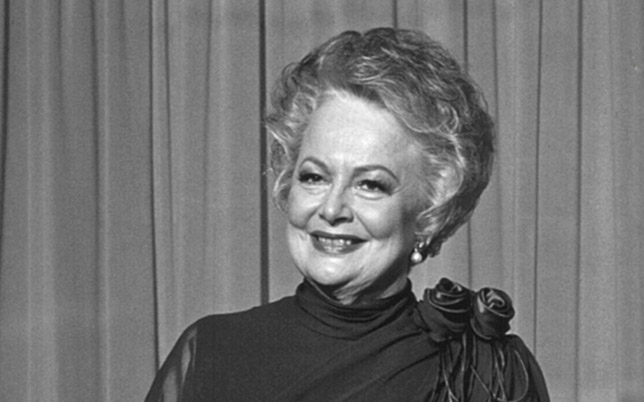
- Industry
Olivia de Havilland
Olivia de Havilland was born in Tokyo on July 1, 1916, of British parents. Her father Walter was an attorney; her mother Lilian, an actress before her marriage, left her cheating husband and moved to California in 1919, with daughters Olivia and her younger sister Joan. Both girls would become movie stars in the 1930s (Joan with the surname of her stepfather George Fontaine), competing for awards in a life-long feud. When asked about her sister during a 1976 interview with Hollywood Foreign Press journalists, De Havilland replied: “We have our offs and our ons, our ins and our outs, our ups and our downs; presently we’re not getting along, we’re having a down, an off, an out, but that could change any day.”
Joan Fontaine, born on October 22, 1917, died on December 15, 2013, without reconciling with her sister. Olivia De Havilland was signed to a seven-year contract by Warner Bros in 1935 at age 18; the demure and refined beauty was paired with the dashing Errol Flynn in the swashbuckling adventure Captain Blood (1935) directed by Michael Curtiz, that made them both stars and a popular screen couple. They made eight films together: Charge of the Light Brigade (1936), The Adventures of Robin Hood (1938), Four’s a Crowd (1938), The Private Lives of Elizabeth and Essex (1939) with Bette Davis, Dodge City (1939), Santa Fe Trail (1940), They Died with Their Boots On (1941). De Havilland then starred with Clark Gable, Vivien Leigh and Leslie Howard in Gone with the Wind (1939), the popular movie from the Margaret Mitchell novel. She praised Clark Gable’s acting to the HFPA in 1976: “He was highly professional and took his work very seriously. What was so attractive in him was his eagerness to be first-rate, to fulfill the public’s idea, but you could see that he was tense about his work because of his fear of failure, which I found charming. And he’s so good in the film; with the passage of time his performance seems to improve.” De Havilland played the long-suffering governess in love with her married employer (Charles Boyer) in Hold Back the Dawn (1941), she was the “good wife” opposite Bette Davis as the “wicked sister” who steals her husband, in a 1942 drama directed by John Huston In This Your Life.
The two actresses were best friends, they made four films together from It’s Love I’m After (1937) to Hush…Hush, Sweet Charlotte (1964) by Robert Aldrich. In real life De Havilland had relationships with James Stewart, who was single and proposed marriage in 1940, then with John Huston, who, like Errol Flynn, was already married; in 1946 she married novelist Marcus Goodrich, and divorced him in 1952. “Divorce was absolutely unthinkable. I had made a promise to love, cherish and obey my husband in an Episcopal ceremony, but he was an arch male chauvinist. So I did some deep thinking about it and I realized that those words, clearly, had to have some limitations, even in the eyes of the church. I went to see an Episcopal priest about this vow, and when I finished telling him the story, he said: You must get a divorce. I said: I can’t, I have very Roman Catholic ideas about that. But eventually I did, because it was necessary.” After successfully suing the studio in 1943, to prevent them from adding six months to her contract, in violation of California labor law, De Havilland was offered more challenging roles in the melodramas To Each His Own (1946) as a mother who has to give up her son, The Snake Pit (1948) as a woman in an insane asylum, The Heiress (1949) directed by William Wyler as a rich girl who exacts revenge on her suitor (Montgomery Clift), My Cousin Rachel (1952) with Richard Burton, as a widow suspected of having poisoned her husband.
A devoted mother to her son Benjamin, born in 1949, De Havilland moved to France in 1953 when she met her second husband, Gaston Bonheur, managing editor of Paris Match, and had a daughter, Gisèle, in 1956. Even after separating from her father in 1962, she remained in Paris close to her daughter, and she still lives in the same house with a view of the Eiffel Tower. Sadly her son Ben died of cancer in 1991 at age 41. She thought it was wonderful to raise her children in France: “To be bilingual, master of more than one language, is a tremendous advantage; it’s also enlarging to the human spirit. It wasn’t a sacrifice for me, because I’m fascinated by the French culture and civilization, so it was a stimulating adventure. I think for every American it’s extremely enriching to live some part of their lives in a foreign country; and it’s important, since we play such a dominant factor in world politics, because it helps us understand other peoples and their problems and not to be too insular in our own experience.”
To be away from Hollywood made it easier to enjoy a private life: “All actresses deeply need a personal life, and I think I have succeeded in having a quite fulfilling life, because it’s geographically removed from my professional life. Of course, I went on coming back to do films, and that worked very well. It’s a different Hollywood now, a lot of very good films come out of it, but the place as a magic kingdom doesn’t exist anymore; and I’m adaptable, so I can accept that. The nice thing for me is to have belonged to and experienced the other Hollywood, which was so full of glamour.”
The Hollywood Foreign Press honored Olivia de Havilland with two Golden Globes, as Best Actress for The Heiress in 1950, as Supporting Actress for the TV movie Anastasia: The Mystery of Anna in 1987, and with a nomination for My Cousin Rachel in 1953.